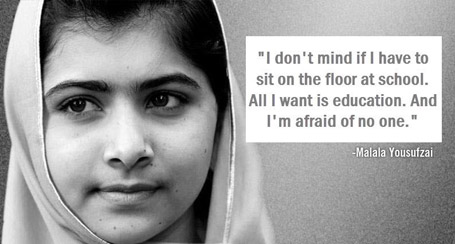What did you do on your 16th birthday? I was probably doing glam line dances with my friends to the Sweet’s Blockbuster (we are talking 1973 here) and stressing about my impending O-levels – typical teenage stuff.
But Pakistani teenager Malala Yousafzai celebrated her coming of age by giving a powerful and inspiring speech to the United Nations in New York on a day that had been named in her honour – Malala Day. In the past year she has been nominated for the Nobel Peace Price, named Time Magazine’s second most influential person of 2013 and has a £2m book deal to write her life story.
I often talk about how one story can change the world and Malala’s is an extraordinary example. This speech – which I urge you to watch in its entirety because it’s one of the most moving and impactful speeches I have seen in a long time – is the first public address Malala has made since her long and painful recovery from a gunshot wound inflicted by the Taliban when she was travelling on a school bus. Her crime? Wanting an education. Or should I say, being female and wanting an education.
Malala was born in Mingora, in Pakistan’s Swat Valley, on the front line of the war between the Pakistan Army and the Taliban – fundamentalists who would deny women most of their rights.
She was fortunate to have a father who was an educational activist and ran his own girls’ school. At an early age she could speak good English and was eager to learn. Her dream was to become a doctor. But her father saw something more in his daughter – he saw someone who could change society so that anyone could become a doctor.
In a valley where people do not hear the voice of a girl, Malala’s father took the extraordinary risk of allowing his daughter to appear in a documentary made by a New York Times journalist.
This “shining young lady” was an ordinary girl who became extraordinary on camera and was turned into a commodity to get the attention of the world. The documentary-makers knew that this brave 11-year-old would be the way to get the story out about what was happening in the Swat Valley, where the Taliban were destroying schools.
At around the same time Malala – using a pen name – started writing a blog called the Diary of a Pakistani Schoolgirl for the BBC. It became an open secret that Malala was the author, and it became increasingly dangerous for her and her family, with the Taliban issuing death threats to her father.
Malala’s attempted assassination by the Taliban last October was a shot that was heard around the world. The story of the shooting, her fight for survival and her long road to recovery have been well documented by the mainstream media and she now stands as a global campaigner for education.
Listening to Malala, I am struck by her grace, her passion, her clarity – but most of all her complete lack of fear. Even at sweet 16, she understands the power of her story and wants to use it to serve the world in a non-violent and compassionate way. She has already forgiven her attackers and wishes only that their children could be educated.
There are many extraordinary moments in her speech, but this was one of the most powerful: “Dear brothers and sisters, we believe in the power and the strength of our words. Our words can change the whole world because we are all together, united for the cause of education. And if we want to achieve our goal, then let us empower ourselves with the weapon of knowledge and let us shield ourselves with unity and togetherness.”
If ever there was a lesson in the power of words and the transformational effect of speaking out, this was it. And then there was the punchline: “One child, one teacher, one book and one pen can change the world.”
As will your story, Malala.

I love how you are working with people and their stories Beverley. I feel this girl is her True Self and love her fearlessness. AMAZING and such an inspiration at such a young age! It sends tingles down my spine. Jx